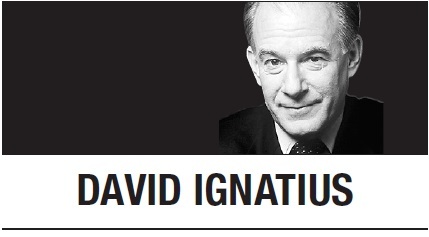At home and abroad, people are now asking a question they’ve dreaded for nearly two years: How will the erratic presidency of Donald Trump function without the steadying hand of Jim Mattis as defense secretary?
Life without Mattis is the scary reality of this new year. The president may have tired of the careful, battle-hardened advice he received from the retired Marine general, but America’s allies depended on Mattis for reassurance.
As one prominent diplomat put it in a message after hearing the news of Mattis’ resignation: “God help us.” This concern was widely shared on Capitol Hill and around the world.
Mapping the contours of defense and foreign policy, post-Mattis, is a useful exercise -- not least because it’s a reminder that the world hasn’t come to an end. Mattis tried to guide an inexperienced and impulsive president, often keeping silent in public to preserve his access, but he knew that his influence with Trump would eventually degrade. It just happened quicker than he wanted.
The first question is who should succeed Mattis. The default choice is Patrick Shanahan, the former deputy who is now acting secretary of defense. He appears to have the trust of both Mattis, who worked closely with him for 18 months, and Trump. Ideally, Shanahan would be the unknown backup quarterback who suddenly gets the call and (to everyone’s surprise) wins the game.
Shanahan has some attributes of a good Pentagon chief. As a former Boeing executive, he knows how the siloed, hyper-bureaucratic world of Pentagon contracting works, and why it’s a total disaster. As Trump said, Shanahan took a mismanaged “787 Dreamliner” project at Boeing and produced a great airplane.
The negatives for Shanahan are also obvious. He lacks top-level political, military or business experience. Running the Pentagon is arguably the most difficult management job in the world. People who succeed at it, like former Secretary Bob Gates, have combined strategic thinking with a willingness to overrule the hidebound and parochial interests of the military bureaucracies.
The next secretary faces a huge challenge that Mattis never fully embraced. The technology of warfare is being transformed, but our military services remain anchored to existing weapons systems and command structures. It is literally impossible, under current rules, to buy and deploy what’s needed. The Pentagon budget is bloated and misspent; it’s largely a log-rolling exercise that preserves the status quo. Does Shanahan have the guts and political skills to write the rules for a new generation of warfare? If so, he’s the right person for the job.
The second post-Mattis challenge falls to Secretary of State Mike Pompeo. As Mattis often said, America needs a less militarized foreign policy -- and a more confident, creative State Department. Pompeo got off to a strong start, picking good people and boosting morale. He seemed to have a knack for checking Trump’s mistakes without infuriating him. He was the “Trump whisperer.”
Pompeo is still managing North Korea diplomacy with a steady hand, from what we can see. But lately, he seems to have entered the Trump “twilight zone,” where he acquiesces on bad decisions, as on Syria and Saudi Arabia, to avoid an open break with his boss. One lesson of the last two years is that trying to tiptoe around Trump is not ultimately a winning strategy -- for Pompeo any more than it was for Mattis.
Pompeo’s daily job description is fulfilling the mission Mattis invoked in his resignation letter: “Our strength as a nation is inextricably linked to the strength of our unique and comprehensive system of alliances and partnerships.” In short, we need diplomacy.
The final member of Trump’s post-Mattis team is John Bolton, the national security adviser. We’ll find out this week if he has the right stuff. He bravely (and correctly) signaled to Turkish President Recep Tayyip Erdogan that Trump’s ruinous “let Turkey do it” deal for Syria withdrawal is off the table, drawing a volcanic Erdogan response Tuesday. If Trump backs Bolton, he may yet stumble to a satisfactory Syria policy. If Bolton retreats, he might as well quit; he will have been shown to have no influence.
And then there’s Trump. The problem Mattis encountered, in the end, was that the president really did think he understood military policy better than his generals, and foreign policy better than his diplomats. This arrogance is destroying Trump’s presidency.
After Mattis, Trump has another fleeting chance to get it right, and halt the process of government by tirade. It’s hard to imagine him coming to his senses, and avoiding the catastrophe ahead, but Trump could start by listening to his advisers.
David IgnatiusDavid Ignatius’ email address is davidignatius@washpost.com. -- Ed.
(Washington Post Writers Group)






